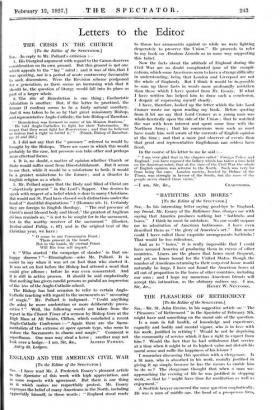Letters to the Editor
THE CRISIS IN- THE CHURCH
[To the Editor of the amen+Tole.] Si —In reply to Mr. Pollard's criticism :-
1. His liturgical argument with regard to the Canon deserves
consideration on its own 'ground. But this ground is itot one which -appeals to the •" lay " mind ; and it was of this,that I was speaking, nor is a period of acute controversy favourable to such discussions. Were the -Revision scheme postponed for a generation, as there seems an increasing wish that it should be,.the question of liturgy would fall into its place as part.of a larger whole.
2. The rite of , Benediction is one thing ; Eucharistic Adoration is another. But, if the latter . be practised, the former (I confess) seems to be a fairly natural corollary. And it was taken to be so by that great missionary Bishop, and representative Anglo-Catholic, the late Bishop of Zanzibar.
Benediction-was licensed_ in many of his Mission Stations.'
He told Anglo-Catholics to fight for their Tabernacles. He meant that they must fight for Reservation ; mid that he believed no .bishop had a right to forbid it.' " (Frank, Bishop of Zanzibar. pp. 35 and 305.)
3. I did not say that -the " pressure " referred to would- be brought by the Bishops. There are cases in which this would probably -be the case, but pressure can take other and perhaps more effectual forms.
4. It is, no doubt, a matter of opinion whether Church or State would suffer most from Disestablishment. But it seems to me that, while it would be a misfortune to both, it would be . a -greater Misfortune to the former ; and a disaster to English religion as a whole.
5. Mr. Pollard argues that the Body and Mind .of Christ are
objectively present " in the Lord's Supper. One desires to speak with respect of a belief which is dear to many Christians. But would not St. Paul have classed such distinctions under the head of " doubtful disputations " ? (Romans xiv. 1). Certainly they are foreign to English theology. ". The real presence of Christ's most blessed body and blood," the greatest of Anglican divines reminds us, " is not to be sought for in the sacrament, but in. the worthy receiver of the sacrament " (Hooker, Ecclesiastical Polity, v. 67) and in the original text of the Christian year, we have : " 0 come to our Communion Feast : There present in the heart,
Not in the hands, th' eternal Priest Will His true self impart."
0. " Who started `the campaign of slander' in that un- happy diocese ? "—Birmingham--asks Mr. Pollard. It is easier to say when it was set on foot than who started it. It was set on foot before the Bishop had uttered a word that could • give offence ; before he was even consecrated. And it is still in active process. It should be said emphatically that nothing has given candid persons so painful an impression of the idos of the Anglo-Catholic school.
The Bishop has had occasion to refer to certain Anglo- Catholic teaching with regard to the sacraments as " savouring of magic." Mr. Pollard is indignant. " Could anything . (he asks) be more unchristian or more deliberately provo- cative ? " Well, the following words are taken from the report in the Church Times of a sermon by Bishop Gore at the nigh Mass at All Saints, Clifton, which concluded a recent Anglo-Catholic Conference :—" Again there are the Saern- mentalists-of the extreme ex opere operato type, who seem to reduce the Sacraments to charm and magic." Comment is superfluous. One man may steal a horse ; another may not look over a hedge.—I am, Sir, &c., ALFRED FAWKES. Ash!.-y St. Ledgers.










































 Previous page
Previous page